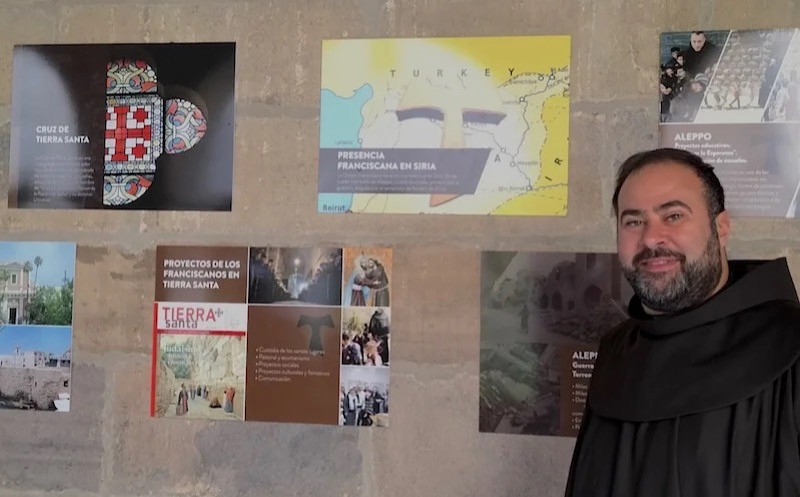Parish priest in Latakia: we live in fear, Alawites (and Christians) want to flee
Brother Fadi Azar, a Franciscan from Jordan, has been a parish priest for five years in the coastal city, once an Assad stronghold. He talked to the Terrasanta online magazine about his fear that the civil war might start up again. In his testimony, he talks about the most tragic phases of the revolt repressed in blood, with thousands of deaths. Talks between Turkey and Israel are underway to avert an armed clash in Syria.
Damascus (AsiaNews) – Latakia, a city on the Syrian coast once considered a stronghold of Bashar al-Assad's regime was the scene a few weeks ago of an attempted revolt against Syria’s new masters.
Brother Fadi Azar, a Franciscan who serves as a parish priest in the city, spoke to AsiaNews about local fears that civil war might break out again and kill thousands more, of Alawites who would like to convert to escape from an oppressive reality, of the memory of the many “corpses [...] in the streets, or killed in homes, burnt alive.”
Syria’s new president, Ahmed al-Sharaa, and the Hay'at Tahrir al-Sham (HTS) paramilitary group crushed the insurrection in blood, plunging the Arab country back to the darkest days of the conflict.
Interviewed by the website Terrasanta, the parish priest said that people in the Alawite heartland (between Latakia and Tartous), once a fiefdom of the Assad clan, have been "living in fear” for a month as “Kidnappings continue, people disappear, with families left in the dark.”
This contradicts the official narrative whereby the new leaders are working for the country’s renaissance and for the inclusion of all its components, including minorities like the Kurds and the Druze.
The new leaders, all coming from the HTS, a group once linked to Islamic and jihadi extremist movements, is still far from being able to ensure peace and democracy in Syria.
Brother Fadi is a Franciscan, originally from Jordan. For the past five years, he has been involved in the pastoral care of the faithful in the coastal city, the fourth largest in the country, along with a confrere, Brother Graziano Buonadonna.
Before the civil war, Alawites represented about 13 per cent of the Syrian population, but they have become associated with the Assad family and the former regime.
“Many parishioners want to leave,” Fr Fadi said. “Instead of asking us for help through the distribution of food parcels or medicines, or to pay the rent, they ask for help to get a visa and escape. Even some Alawites have come forward saying they are willing to become Christians for help to leave Syria.”
Alawites who worked in the public sector were among the first targets of repression, with large-scale dismissals and the obligation for women to wear the veil.
In retaliation against the uprising, which shook the new Syrian regime for a few days, “residents of entire villages and neighbourhoods in the city of Latakia were killed," the parish priest said.
"In Baniyas, they also attacked Christians, stole their cars, stole from homes, but did not kill them.”
“Elsewhere, there were killings, including Christians: Fadi and Antoine Butros were killed. The father and son were in Qardaha, even though they were not originally from there. A 27-year-old man, Tony Khoury, and the father of a student from Baniyas, who went out of his home because his car was being stolen, were killed. And the father of an Orthodox priest, Fr Gregorios. Another young Christian was captured at a checkpoint because he had been drafted in the army of the former regime and went missing.”
The situation is still far from being pacified and there are many unresolved problems: fear, lack of water and electricity, fear of jihadi gangs and armed groups, many of them foreigners.
Many fighters, the clergyman noted, come “from the Idlib area (fiefdom of the opponents and base of the anti-Assad revolt last November). They are controlled by the Turkish secret services. The new government in Damascus exerts no real control.”
The priest urges people to be patient and avoid “taking risky routes”. Some people “would like to go to Lebanon or Turkey and from there embark to reach Greece. The border with Turkey remains closed for Syrians and only people with Turkish citizenship or have a residence permit in Turkey are allowed to enter.”
Meanwhile, Turkey and Israel are holding talks to avert military hostilities in Syria. The two countries hold opposing interests and aims that could trigger a confrontation on the ground.
Turkey and Israel are engaged in technical talks to establish a deconfliction mechanism in Syria. According to Channel 12 news, citing an Israeli source, “a mechanism will be established, similar to the one built between Israel and Russia.”
In a cabinet meeting, Israeli Prime Minister Benyamin Netanyahu told his ministers that he was not seeking a confrontation with Turkey in Syria, but that he would not hesitate to "act if necessary" to defend Israel.
For his part, Turkish Foreign Minister Hakan Fidan earlier told CNN that the two countries have been holding talks on the matter “when needed,” even in the face of the intensification of the Jewish state's bombing of Syria.
The Turkish foreign minister said these talks are solely for deconfliction in Syria and do not aim at normalising relations. For Turkey’s foreign ministry, Israel remains “the greatest threat to regional security.”
26/07/2023 18:24
09/08/2021 14:38







.png)










